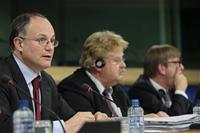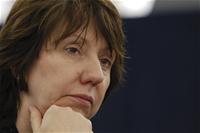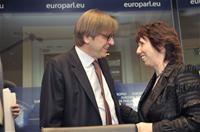The Madrid compromise unblocked the establishment of the European diplomatic service
Ralitsa Kovacheva, July 11, 2010
 The Spanish Presidency of the European Union has ended with many unresolved issues, but with one big breakthrough - the Madrid compromise on the European External Action Service. The creation of the Service, one of the most important consequences of the entry into force of the Lisbon Treaty was marked by protracted disputes and allegations of attempts to achieve greater influence in the EEAS among the various European institutions on the one hand, between the institutions and Member States on the other, and between the member states themselves - on the third.
The Spanish Presidency of the European Union has ended with many unresolved issues, but with one big breakthrough - the Madrid compromise on the European External Action Service. The creation of the Service, one of the most important consequences of the entry into force of the Lisbon Treaty was marked by protracted disputes and allegations of attempts to achieve greater influence in the EEAS among the various European institutions on the one hand, between the institutions and Member States on the other, and between the member states themselves - on the third.
The background
When Baroness Ashton revealed in March her first proposal on the new institution, MEPs described it as “unacceptable”. The reasons: the proposed structure with an omnipotent secretary-general and deputy secretary-generals does not provide the service with the necessary "political legitimacy" that could help the High Representative to do her job properly; the proposal pays little attention to Parliament in terms of political accountability and provides for an artificial separation of part of the competences, related to development, between the EEAS and the Commission.
As a Brussels diplomat explained to euinside, MEPs had insisted on guarantees that the Service would be built according to the community method (a prominent thesis of Parliament for all important issues of the last months), that future diplomats from the Member States would be loyal to the European service rather than to their home countries; that baroness Ashton would bear political responsibility to Parliament, and the Parliament, in turn, would have political and budgetary supervisory powers over the EEAS.
The compromise
All these concerns are addressed in the Madrid compromise, reached on June  21st between HR Catherine Ashton, the Commission and the Parliament, represented by three MEPs: Elmar Brok, (EPP, Germany), Guy Verhofstadt (ALDE, Belgium) and Roberto Gualtieri (Italy, Group of the S&D). Elmar Brok presented a report on the agreement to his colleagues in Parliament, which they supported and thus a carte blanche was given the concrete work on the Service establishment to begin. After the summer break the Parliament will vote on the changes related to Financial Regulation, Staff Regulation and the 2010 budget amendments.
21st between HR Catherine Ashton, the Commission and the Parliament, represented by three MEPs: Elmar Brok, (EPP, Germany), Guy Verhofstadt (ALDE, Belgium) and Roberto Gualtieri (Italy, Group of the S&D). Elmar Brok presented a report on the agreement to his colleagues in Parliament, which they supported and thus a carte blanche was given the concrete work on the Service establishment to begin. After the summer break the Parliament will vote on the changes related to Financial Regulation, Staff Regulation and the 2010 budget amendments.
 While solving the specific issues, we have to remember the most important thing - the reason for the creation of the EEAS, baroness Ashton said before of MEPs: “The European Union and the Member States have an impressive array of instruments, resources, relationships and expertise to help build a better, more stable world. Now we need to bring all this together”.
While solving the specific issues, we have to remember the most important thing - the reason for the creation of the EEAS, baroness Ashton said before of MEPs: “The European Union and the Member States have an impressive array of instruments, resources, relationships and expertise to help build a better, more stable world. Now we need to bring all this together”.
She stressed that the agreement was fully in line with the community method. As MEPs have strongly insisted, at least 60 percent of the EEAS staff will be permanently employed civil servants. At least one third will be representatives from the diplomatic services of member countries - temporary agents for a duration of up to eight years with a possible extension of two years. Ashton has committed to provide adequate geographical and gender balance when recruiting.
All Bulgarian MEPs are united in their position that new Member States should insist on receiving a fair representation in the Service because they are disadvantaged, compared to the older members, in the current European institutions. For this purpose, however, they must provide the best possible candidates.
The EEAS will have its headquarters in Brussels and will be made up of a central administration and the 136 former Commission delegations, now EU embassies. The central administration will be organised in directorates-general comprising of geographic desks covering all countries and regions of the world, as well as multilateral desks. The Parliament has also ensured EU Special Representatives and Heads of Delegations to countries and organisations which the Parliament considers "strategically important" to appear before the Foreign Affairs Committee before taking up their posts.
MEPs have also won some rights for political and budgetary control over the EEAS. Regarding the political responsibility of the High Representative, right after the meeting in Madrid Catherine Ashton presented a political declaration, outlining her responsibilities to Parliament. Including the question who should substitute her - an issue especially painful for the MEPs, who claimed her deputies should be political representatives, rather than civilian servants of the Secretariat. Ultimately, these will be the Commissioners in charge of development, neighbourhood and humanitarian aid, and, in Ashton's words, “from time to time also a Member of the Foreign Affairs Council from the rotating Presidency or the Presidency trio."
EEAS operational budget will be a responsibility of the Commission. However, it will send to Parliament a document clearly accounting for the external action parts of the Commission's budget, including the establishment plans of the Union's delegations, as well as the external action expenditures per country and per mission. The Foreign Affairs Committee and the Budgets Committee bureaus will have stronger scrutiny rights over CFSP Common Foreign and Security Policy) missions financed out of EU's budget.
The development and neighbourhood policies' funds remain also in Commission's hands. Member States insisted the EEAS to have more power to allocate these funds, but MEPs were strongly against. According to Ashton's initial proposal in March, all proposals related to the European Neighbourhood and Partnership Instrument, shall be prepared under the direct supervision and guidance of the Neighbourhood Policy Commissioner. And those related to the European Development Fund and the Development Cooperation - accordingly - will be supervised by the Commissioner, responsible for Development Policy. The Commission has the final word on the allocation of funds.
"We don't want to drive the EU's Foreign Policy but we want to monitor it and want sensible budgetary decisions to be made", deputy Elmar Brok commented. He also expressed the common expectation that “the EEAS will allow the EU to become "a global player instead of payer" on the international stage”.
 "Allow me to give one advice", said the leader of the ALDE Group Guy Verhofstadt to Ashton, "develop the service as a community institution. It is only where the Community method is applied that we have had successes such as in the internal market field".
"Allow me to give one advice", said the leader of the ALDE Group Guy Verhofstadt to Ashton, "develop the service as a community institution. It is only where the Community method is applied that we have had successes such as in the internal market field".
The socialist Roberto Gualtieri expressed his satisfaction to see that the EEAS would be closely linked to the Community method and democratically controlled. In the same spirit was the statement of the Bulgarian MEP from the S&D Group, Ivaylo Kalfin: “Clear responsibility and design of the entire budget procedure gives us confidence that the EU foreign policy will be generated and implemented effectively enough by all institutions involved, with clear rules for accountability”.
What is next
Everybody, however, agrees on one thing - the compromise that has been reached is a good start, but there is still much work to be done in order the Diplomatic Service to start working effectively. Because problems are yet to come in solving specific problems.
"Catherine Ashton must therefore pose some tough questions“, ALDE representative Andrew Duff (LibDem, UK) commented. “For example, why do five EU states still refuse to recognise the independence of Kosovo? Why is Greece allowed to block the emergence of Macedonia as a state? Why is there still cold war between Turkey and Cyprus?"
Even these examples show what a sensitive area foreign policy is and how difficult it would be for 27 Member States to speak if not with one voice, at least not in disharmony. And if Kissinger was asking whom to call when he wanted to talk to Europe, you can imagine how difficult it is 27 countries to agree only one to speak on behalf of all if they want to call anyone in the world?
 Federica Mogherini | © Council of the EU
Federica Mogherini | © Council of the EU | © Council of the EU
| © Council of the EU Luis De Guindos | © Council of the EU
Luis De Guindos | © Council of the EU